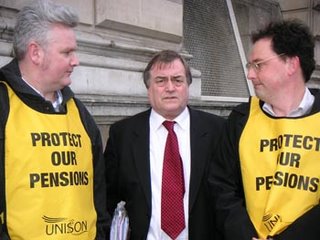Get off the (picket) fence
 My first day on a picket line past relatively uneventfully. I arrived just after nine (about the time I'd normally get to work) to discover a veritable phalanx of council workers arrayed around the entrance, armed with the obligatory placards, flyers, stickers and banners. When somebody asked for volunteers to stand by one of the other entrances I volunteered and before you can say, "Rookie mistake," I was standing by the entrance to the car park ineffectually waving leaflets at passing vehicles. Fortunately, we were soon called back to the front where we remained, leafletting those who tried to leave the building, until about twelve when we all piled into the nearest pub.
My first day on a picket line past relatively uneventfully. I arrived just after nine (about the time I'd normally get to work) to discover a veritable phalanx of council workers arrayed around the entrance, armed with the obligatory placards, flyers, stickers and banners. When somebody asked for volunteers to stand by one of the other entrances I volunteered and before you can say, "Rookie mistake," I was standing by the entrance to the car park ineffectually waving leaflets at passing vehicles. Fortunately, we were soon called back to the front where we remained, leafletting those who tried to leave the building, until about twelve when we all piled into the nearest pub.Judging the success of the day's action is something of a challenge. It was difficult to escape the impression that most of the employees where I work were more than happy to go about their business as usual. Most were happy enough to take a flyer and many expressed their support, but they apparently saw no disconnect between this and crossing a picket line. In my office, I understand that only three out of seventeen people were on strike, although one of those people didn't want to join the picket line. Fellow picketers suggested that participation from other areas was even lower. That said, even the Local Government Association (LGA), who represent council employers, estimate that more than 400,000 council workers in England participated, while the BBC suggests that there was extensive disruption across much of the country. If nothing else, we managed to piss-off Digby Jones (head of the Confederation of British Industry, the UK's leading union for bosses) which is hardly difficult, but remains strangely satisfying nonetheless.
 However many workers may have come out, it was always less than unlikely that we'd win after one strike. The obvious question, therefore, is where we go from here. According to various reports and the word on the picket line, there's talk of selective action over the coming weeks and another strike on May 3 and 4 to coincide with local elections. Which I suppose gives me a month to work on my colleagues...
However many workers may have come out, it was always less than unlikely that we'd win after one strike. The obvious question, therefore, is where we go from here. According to various reports and the word on the picket line, there's talk of selective action over the coming weeks and another strike on May 3 and 4 to coincide with local elections. Which I suppose gives me a month to work on my colleagues...In France, meanwhile, the campaign against the CPE law (which you may recall we've discussed previously) continues apace. Today's General Strike (rebranded the "General Dream" by some of the more radical participants) has disrupted flights through French airspace and witnessed the largest demonstrations against the legislation thus far. French PM Dominique de Villepin is making the usual noises about standing firm, although his call for "discussions" with students and trade unionistsm (explicitly rejected by the former) sounds increasingly desperate. With the majority of the French population behind demonstrators and his cabinet manouvering around him, it's hard to believe that he isn't going to have to concede sooner or later.
Which all goes to show that the people who like to tell you class struggle is dead don't know what they're talking about.
File Under: News, Pensions, Politics, Union, UK



















<< Home